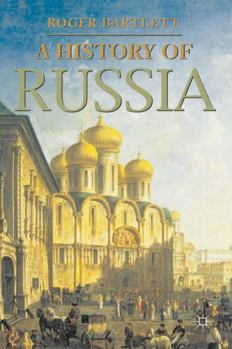Book Overview
Russia is the largest country on the planet, a multi-ethnic empire, a great power of global significance. For much of its history it has been a 'peasant state', in which peasant society and values interacted critically with those of the ruling elites. In modern times its society has produced artists, writers, musicians, scientists and cosmonauts who have made a unique contribution to world culture. In the twentieth century, Russia has been the scene of the world's greatest social experiment - the most powerful challenge ever mounted to hegemonic Western values.
Roger Bartlett traces the history of the country from its beginnings in Kiev Russia, through the Muscovite and Imperial, Soviet and post-Soviet periods, to the start of the twenty-first century. While offering a broad perspective on Russia's historical development, Bartlett focuses on the origins of Russian political culture and the place of the majority peasant population in the Russian/Soviet polity. Lucid, balanced and authoritative, it is the ideal introduction for all those with an interest in Russia's past, and its significance for the country's present.Format:Hardcover
Language:English
ISBN:033363263X
ISBN13:9780333632635
Release Date:June 2005
Publisher:Bloomsbury Publishing PLC
Length:336 Pages
Weight:1.35 lbs.
Dimensions:0.9" x 5.8" x 8.7"
Customer Reviews
1 rating
A Decent introduction to Russian history in English
Published by Thriftbooks.com User , 17 years ago
A History Russia gives a balanced, complete and yet compact history of Russia for the English speaking reader covering the period up to Putin's period in the Kremlin. If you want an introduction to Russian history and society from Kiev Rus to the Yeltsin era, this is a good choice. If the Putin years is essential to you, you have to look elsewhere. If you want a compact historic review and can live with this shortcoming, this can be a good choice. In the following I will present some of the strengths and weeknesses I find in Barlett's book: Generally Barlett delivers a very good historical review of Russia from the birth of the principality of Moscow about 1300, to the Khruchev years until 1964. Especially I appreciate his coverage of life at the countryside in Emperial Russia, a part of Russian hisotory and civilication that can hardly be overestimated, but never the less gets a limited coverage in histories of Russia. On the other hand, in my opinion has some weeknesses that explaines why I have given only 4 stars despite the good coverage up to 1964 - 5 stars up to 1964 and 3 stars from 1964 to the present if you like. In his coverage of the Brezhnev years, Bartlett's analysis of the political processes within the Kremlin has weeknesses. For instance Bartlett claims Brezhnev was, at least in the easrly years, a weeker leader than Khruschov and reversed the de-Staliniaztion under Khruschev. Compared to Khruschev this is true, but when comparing with his main rivals for the possition as a general secretary the neo-Stalinist Suslov and the anti Stalinist with "new great leader ambitions" Shelepin, it becomes clear that this analysis has limited relevance. Brezhnev won the battle of power because the Soviet leadership prefered a leader that was relatively week politically and moderate with regards to Stalinism. Bartlett more or less totally ignores Yury Andropov. Though his period in office was limited to 15 months, Andropov and his period in office is associated with some important political issues that any good histroy of Russia must include. The fight against corruption and formalization of byreucratic processes, his appointment and promotion of Political figures as Gorbachev and Shevardnadze, that Andropov was the initiator of the perestroyka policy ("the chain of command is ruined and needs to be restored") and that one to a large degree can argue that Andopov's apointment was a result of that the army and KGB "took over" in Soviet politics after decades of economic and political mismanagement under Brezhnev (in contract to Ukraine, where one can argue that the same corrupt Dniepropetrovsk mafia stayd in charge until Kuchma left office). I miss some coverage of the daily life of ordinary people in Soviet times, like he includes life on the country sides in Emperial Russia. With structuring the chapters more along subjects in addition to the strict timeline (like Andrew Wilson does in his history of Ukraine by including chapte






